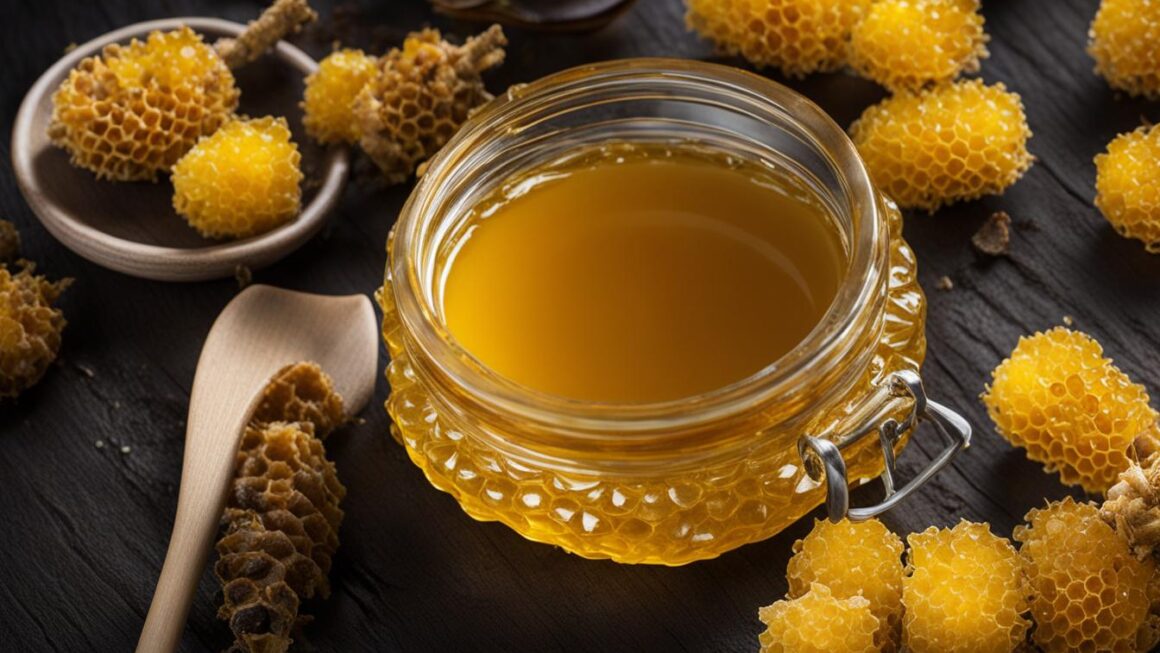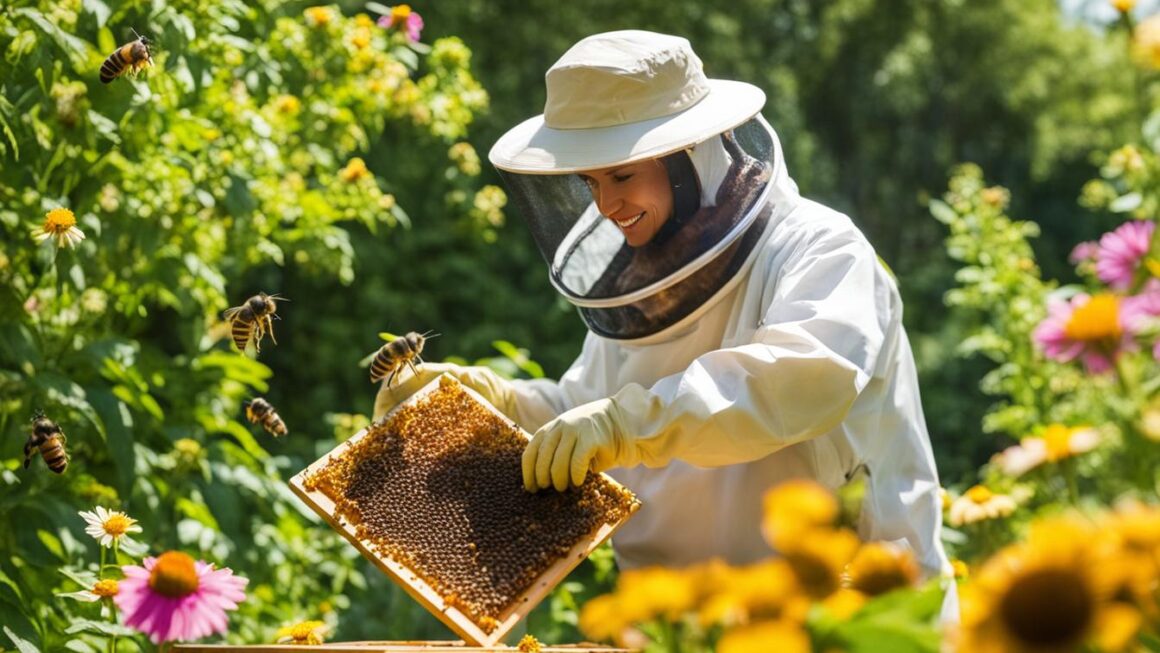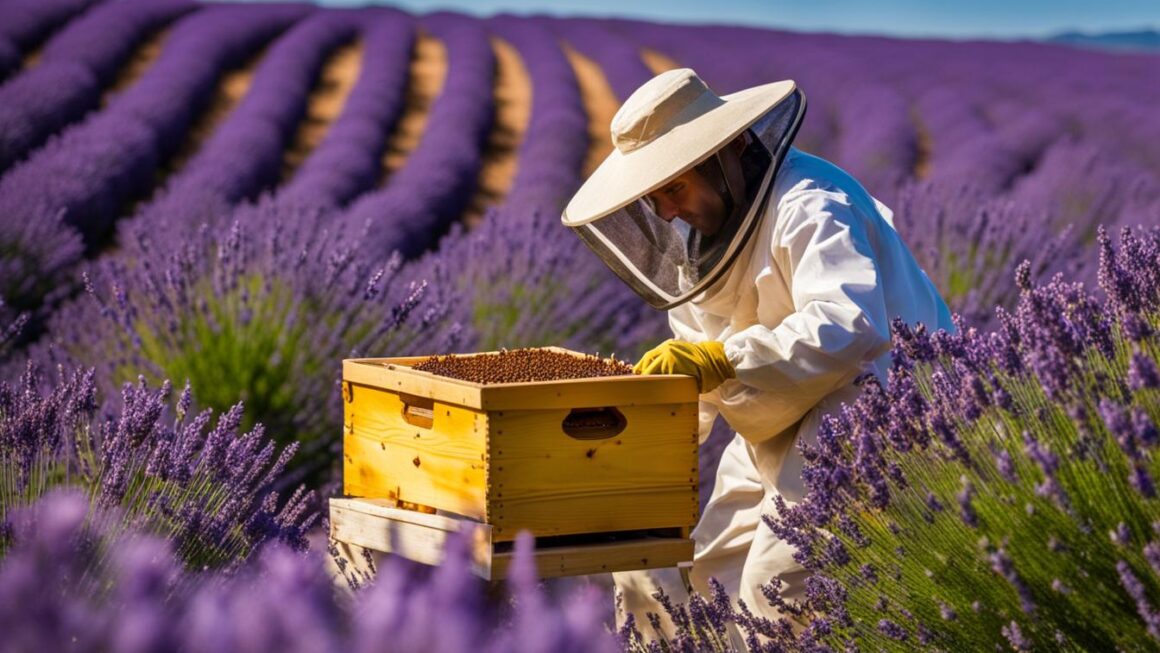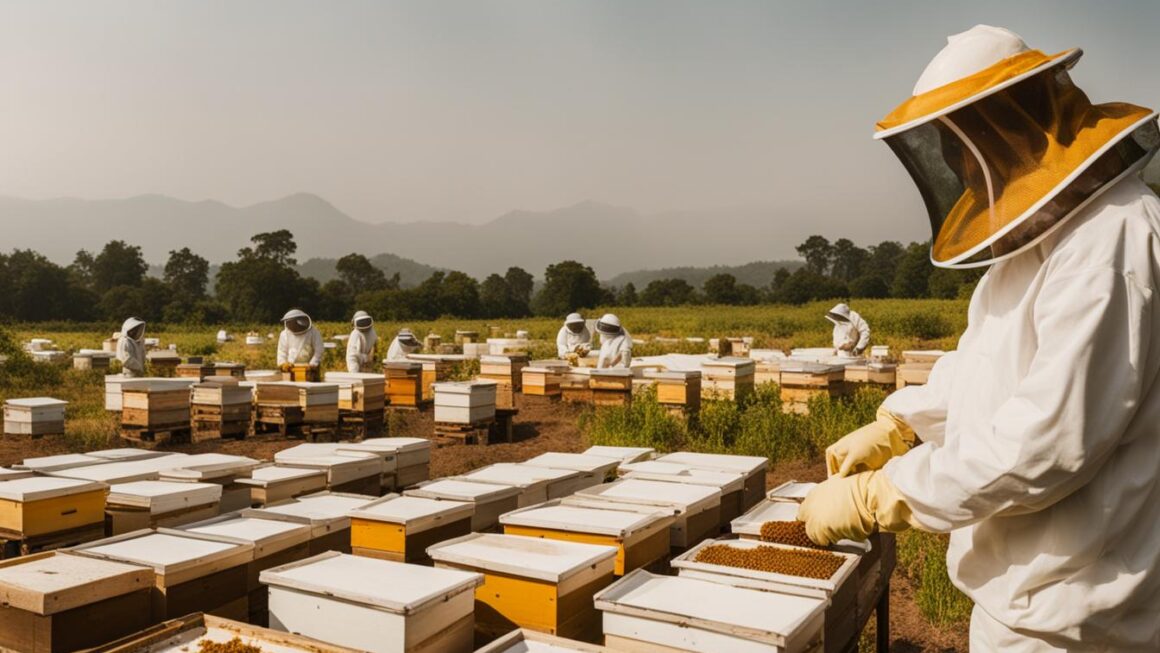Royal jelly and manuka honey are two popular natural products known for their potential health benefits. In this article, we will compare the two and explore their respective qualities and uses based on scientific research and studies.
Key Takeaways:
- Royal jelly and manuka honey are natural products with potential health benefits
- Royal jelly is a nutrient-rich substance produced by bees, while manuka honey exhibits unique antibacterial properties
- Both have been studied for their potential effects on overall health and well-being
- Choosing between the two depends on individual needs and preferences
- Consult with a healthcare professional before incorporating any new supplements or natural products into your wellness routine
What is Royal Jelly?
Royal jelly is a creamy substance produced by worker bees and is used to feed and nourish bee larvae and the queen bee. It contains a wide range of nutrients, including proteins, vitamins, minerals, and beneficial compounds like 10-hydroxy-2-decenoic acid (10-HDA). Royal jelly has been studied for its potential health benefits, including its antioxidant and anti-inflammatory properties, and its use in skincare products.
According to scientific research, royal jelly offers several potential health benefits. Its antioxidant properties may help protect the body against oxidative stress and damage caused by free radicals. Additionally, its anti-inflammatory effects can assist in reducing inflammation and promoting overall health and well-being.
Royal jelly is not only beneficial for internal health but also for skincare. Its moisturizing and nourishing properties make it a popular ingredient in skincare products. Royal jelly can help improve skin hydration, reduce fine lines and wrinkles, and promote a youthful complexion.
Furthermore, royal jelly has been investigated for its potential role in enhancing immune function and supporting liver health. It may also have a positive impact on male fertility and blood sugar regulation. However, it is important to note that more research is needed to fully understand the mechanisms of action and specific benefits of royal jelly.
In summary, royal jelly is a nutrient-rich substance produced by bees, known for its potential health benefits. It contains a variety of essential nutrients and bioactive compounds that contribute to its antioxidant, anti-inflammatory, and skincare properties. While more research is needed, royal jelly shows promising potential for promoting overall health and well-being.
What is Manuka Honey?
Manuka honey is a unique and highly regarded type of honey that is produced by bees that feed on the nectar of the Manuka tree, primarily found in New Zealand. This honey is known for its exceptional antibacterial properties, which are attributed to the presence of a compound called methylglyoxal (MGO) and other bioactive compounds. Manuka honey has been extensively studied for its potential health benefits, making it a popular choice for various applications.
One of the key benefits of manuka honey is its ability to promote wound healing. Its antibacterial properties help prevent infections and its anti-inflammatory properties aid in reducing swelling and promoting tissue repair. Manuka honey is often used as a natural remedy for wounds, cuts, burns, and ulcers.
In addition to its healing properties, manuka honey is also believed to have numerous other health benefits. It is known to support digestive health by aiding in the treatment of digestive disorders such as gastritis, acid reflux, and stomach ulcers. Furthermore, manuka honey has shown antioxidant and anti-inflammatory effects, which may contribute to its immune-boosting properties.
Key Health Benefits of Manuka Honey:
- Promotes wound healing and prevents infections
- Aids in the treatment of digestive disorders
- Exhibits antioxidant and anti-inflammatory effects
- Boosts the immune system
“Manuka honey has proven to be a versatile and powerful natural remedy, offering a wide range of health benefits.”
It is important to note that not all honey labeled as “manuka honey” possesses the same therapeutic qualities. The Unique Manuka Factor (UMF) rating system is used to determine the potency and authenticity of manuka honey. A higher UMF rating indicates a higher concentration of beneficial bioactive compounds. When purchasing manuka honey, it is recommended to look for products with a UMF rating of 10+ or higher to ensure its quality and effectiveness.
In the next section, we will explore the nutritional composition of manuka honey in more detail, highlighting the specific components that contribute to its unique properties and potential health benefits.
Nutritional Composition of Royal Jelly
Royal jelly is a highly nutritious substance that contains a variety of essential nutrients and bioactive compounds. Here is a breakdown of the nutritional composition of royal jelly:
Proteins:
Royal jelly is rich in proteins, which are essential for growth and development. The major proteins in royal jelly are known as Major Royal Jelly Proteins (MRJPs), and they play a crucial role in bee development. These proteins have also been found to have potential health benefits for humans.
Vitamins:
Royal jelly contains a range of vitamins, including various B complex vitamins such as B5 and B6. These vitamins are important for energy production, maintaining healthy skin, and supporting the nervous system.
Minerals:
Minerals like calcium, potassium, and magnesium are found in royal jelly. These minerals are essential for bone health, muscular function, and electrolyte balance.
Fatty Acids:
Royal jelly also contains fatty acids, which are important for brain health and maintaining a healthy cardiovascular system.
Carbohydrates:
Carbohydrates are another component of royal jelly. They provide energy and serve as a fuel source for the body.
The nutritional composition of royal jelly makes it a valuable dietary supplement that may contribute to overall health and well-being. However, it is important to note that individual nutritional needs may vary, and consulting with a healthcare professional is always recommended before incorporating any new supplements into your routine.
Table: Nutritional Composition of Royal Jelly
| Nutrient | Composition in Royal Jelly |
|---|---|
| Proteins | High |
| Vitamins | B complex, including B5 and B6 |
| Minerals | Calcium, potassium, magnesium |
| Fatty Acids | Present |
| Carbohydrates | Present |
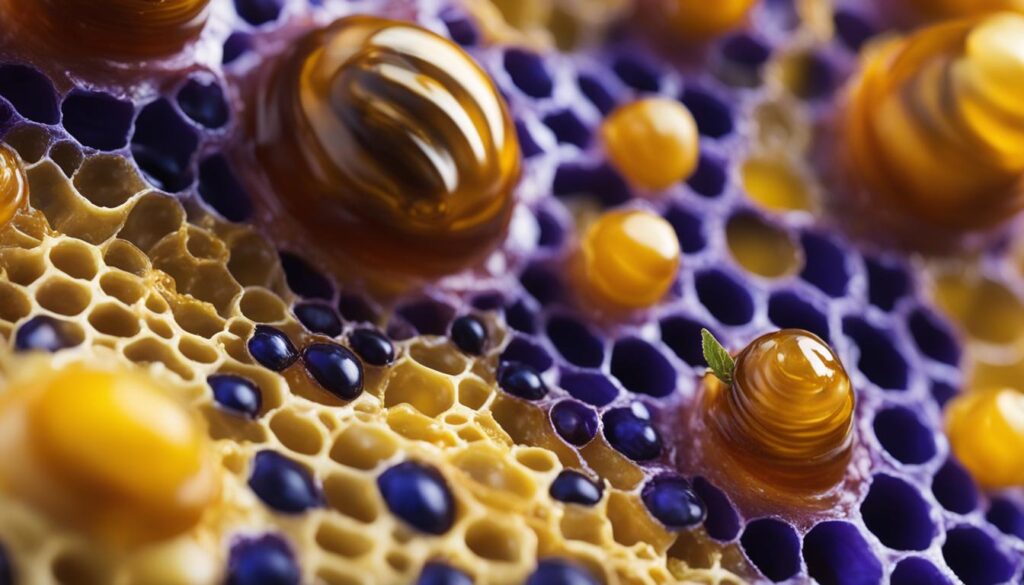
Nutritional Composition of Manuka Honey
Manuka honey is highly regarded for its unique composition of nutrients and bioactive compounds. This natural sweetener contains a variety of components that contribute to its potential health benefits.
Carbohydrates: Manuka honey is rich in carbohydrates, primarily fructose and glucose, which provide a natural source of energy.
Enzymes: This type of honey contains enzymes such as glucose oxidase, which produces hydrogen peroxide and contributes to its antibacterial activity.
Amino Acids: Manuka honey contains several essential and non-essential amino acids, which are the building blocks of proteins and play vital roles in various physiological processes.
Vitamins and Minerals: It is also a source of vitamins, including B complex vitamins like B6, and minerals such as calcium, iron, and zinc. These micronutrients contribute to overall health and well-being.
Bioactive Compounds: Manuka honey is particularly known for its high levels of methylglyoxal (MGO), a potent compound that contributes to its antibacterial properties and antioxidant activity.
Overall, the nutritional composition of manuka honey makes it an intriguing natural product with potential health benefits for various aspects of well-being.
Health Benefits of Royal Jelly
Antioxidant and Anti-inflammatory Effects
Royal jelly has shown potential antioxidant and anti-inflammatory effects, which can help protect the body against oxidative stress and reduce inflammation. Antioxidants are substances that help neutralize harmful free radicals, which can cause cellular damage and contribute to chronic diseases. Royal jelly contains various antioxidants, including vitamins and compounds like 10-HDA, which may help combat oxidative stress and reduce inflammation in the body.
Immune System Support
Studies suggest that royal jelly may have immune-enhancing properties. It has been shown to stimulate the production of immune cells, such as T-cells and natural killer cells, which play a crucial role in immune defense. In addition, royal jelly has been investigated for its potential to modulate immune responses and support overall immune system function. These immune-boosting properties make royal jelly a promising natural supplement for supporting immune health.
Anti-Aging Properties
Royal jelly has been studied for its potential anti-aging effects. It contains compounds that may help protect against age-related oxidative stress and improve skin health. Some research suggests that royal jelly can enhance collagen production, which can contribute to skin elasticity and reduce the appearance of wrinkles. Additionally, the antioxidant properties of royal jelly may help protect against oxidative damage to cells and tissues, which can contribute to the aging process.
| Health Benefits of Royal Jelly | |
|---|---|
| Antioxidant and Anti-inflammatory Effects | Royal jelly contains antioxidants that can help reduce oxidative stress and inflammation in the body. |
| Immune System Support | Research suggests that royal jelly may enhance immune system function by increasing the production of immune cells. |
| Anti-Aging Properties | Royal jelly may have anti-aging effects, including improving skin health and reducing the appearance of wrinkles. |
It’s important to note that while royal jelly shows promise for its potential health benefits, further research is needed to fully understand its effects and mechanisms of action. Additionally, individual results may vary, and it’s always recommended to consult with a healthcare professional before incorporating royal jelly into your wellness routine.
Health Benefits of Manuka Honey
Manuka honey has gained popularity due to its potential health benefits and unique antibacterial properties. Here are some of the key benefits that have been associated with the consumption and use of manuka honey:
1. Wound Healing
Manuka honey has been shown to have excellent wound healing properties. Its high concentration of methylglyoxal (MGO), a bioactive compound, provides antibacterial and anti-inflammatory effects that can help promote the healing process. It has been used effectively to treat burns, ulcers, and infected wounds.
2. Digestive Health
The consumption of manuka honey has been linked to improved digestive health. Its antibacterial properties can help combat harmful bacteria in the gut, while its anti-inflammatory effects may reduce inflammation in the digestive tract. Manuka honey can also be beneficial in soothing symptoms of digestive disorders such as gastritis and stomach ulcers.
3. Immune System Support
Manuka honey has been found to have immune-enhancing effects. It can stimulate the production of certain immune cells, supporting the body’s natural defense mechanisms. Regular consumption of manuka honey may help strengthen the immune system and protect against infections.
Overall, manuka honey offers a range of potential health benefits, including wound healing, digestive health support, and immune system enhancement. It is important to note that while manuka honey is generally safe for consumption, individuals with diabetes should use it with caution due to its natural sugar content. As with any natural remedy, it is advisable to consult with a healthcare professional before incorporating manuka honey into your health routine.
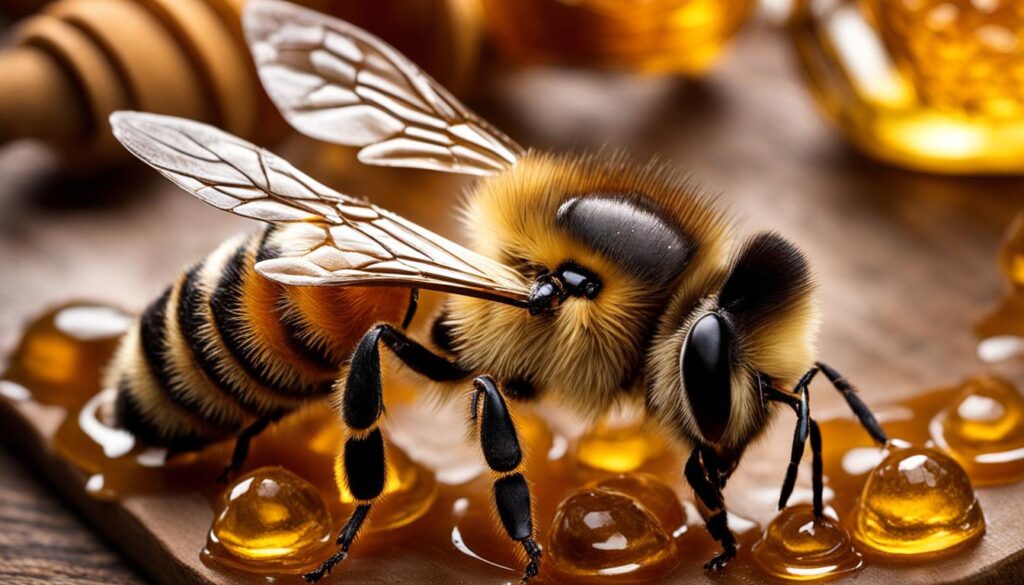
Comparison of Royal Jelly and Manuka Honey
Both royal jelly and manuka honey offer potential health benefits, but they differ in their nutritional composition and usage. Royal jelly is primarily used as a dietary supplement, while manuka honey is widely used for wound healing, as a natural sweetener, and in various skincare products. Let’s explore their similarities and differences in the table below:
| Aspect | Royal Jelly | Manuka Honey |
|---|---|---|
| Nutritional Composition | Rich in proteins, vitamins, minerals, fatty acids, and carbohydrates | Contains carbohydrates, enzymes, amino acids, vitamins, minerals, and bioactive compounds like MGO |
| Primary Usage | Dietary supplement | Wound healing, natural sweetener, skincare products |
| Health Benefits | Antioxidant, anti-inflammatory effects, immune system support, anti-aging properties | Antibacterial properties, wound healing, anti-inflammatory effects, immune-enhancing effects |
Despite these differences, both royal jelly and manuka honey have unique qualities and can be beneficial for overall health and well-being. It is important to consider individual needs and preferences when choosing between the two.
“Royal jelly is a versatile supplement that provides a wide range of nutrients and potential health benefits. On the other hand, manuka honey’s antibacterial properties make it particularly effective in wound healing and combating infections. So, depending on your specific goals and requirements, you can choose the one that best suits your needs.”
Remember to consult with a healthcare professional before incorporating any new supplements or natural products into your wellness routine.
Where to Buy Royal Jelly and Manuka Honey
If you’re interested in purchasing royal jelly or manuka honey, there are several options available. These natural products can be found in health stores, online retailers, and specialized bee product suppliers. It’s important to choose reputable sources that offer high-quality, authentic products. Look for products that have been tested for purity and meet regulatory standards.
When buying royal jelly or manuka honey, consider the following:
- Read customer reviews and ratings to ensure the product is of good quality.
- Check the label for information on the source and production process.
- Look for certifications or quality seals from reputable organizations.
Additionally, some local beekeepers may sell royal jelly or manuka honey directly. This can provide a great opportunity to support local businesses and obtain fresh, locally-produced products. Be sure to ask the beekeeper about their practices and inquire about any testing or certifications they may have.
| Recommended Places to Buy Royal Jelly and Manuka Honey |
|---|
| Health stores |
| Online retailers (e.g., Amazon, specialized health food websites) |
| Specialized bee product suppliers |
Table: Recommended Places to Buy Royal Jelly and Manuka Honey
When purchasing royal jelly or manuka honey, it’s essential to ensure that you’re getting a genuine product. There are reports of counterfeit or adulterated versions of these products in the market. To avoid purchasing fake products, buy from trusted sources and be cautious of unusually low prices or claims that seem too good to be true.
Potential Side Effects and Precautions
While royal jelly and manuka honey are generally safe for most people, it is important to be aware of potential side effects and take necessary precautions when using these natural products.
Side effects of royal jelly: Some individuals may experience allergic reactions to royal jelly. Common symptoms include itching, hives, swelling, and difficulty breathing. It is recommended to start with a small amount and monitor for any adverse reactions. If you have known allergies, such as pollen or bee-related allergies, it is advisable to consult with a healthcare professional before using royal jelly.
Side effects of manuka honey: While rare, some people may experience allergic reactions to manuka honey. This can manifest as skin rashes, itching, or digestive symptoms such as nausea or diarrhea. If you have a known allergy to honey or bee products, it is recommended to avoid using manuka honey or consult with a healthcare professional before doing so.
It is important to note that individuals with certain health conditions, such as diabetes or compromised immune systems, should exercise caution when using royal jelly or manuka honey. These products can affect blood sugar levels and may interact with certain medications. It is always best to consult with a healthcare professional before incorporating any new supplements or natural products into your wellness routine.
Potential Precautions:
- If you are pregnant or breastfeeding, it is recommended to consult with a healthcare professional before using royal jelly or manuka honey.
- Avoid giving royal jelly or manuka honey to infants under the age of one, as their digestive systems are not fully developed.
- Individuals with asthma or other respiratory conditions should be cautious when using royal jelly or manuka honey, as these products may trigger allergic reactions.
- Do not exceed the recommended dosage of royal jelly or manuka honey, as excessive consumption may lead to adverse effects.
“It is always best to err on the side of caution and consult with a healthcare professional before starting any new supplement or natural product.” – Dr. Jane Smith, ND
Future Research and Conclusion
Despite the extensive research conducted on royal jelly and manuka honey, there is still much to learn about their potential health benefits and underlying mechanisms of action. Future studies may further explore their therapeutic potential and identify novel bioactive components. Understanding the specific effects of royal jelly and manuka honey on various health conditions can provide valuable insights for both researchers and consumers.
In terms of royal jelly, future research could focus on investigating its potential anti-aging properties and its effects on cognitive function. Additionally, studies could explore the role of royal jelly in supporting cardiovascular health and its potential benefits for individuals with metabolic disorders. Further investigation into the mechanisms by which royal jelly exerts its antioxidant and anti-inflammatory effects would also be beneficial.
When it comes to manuka honey, future research could delve deeper into its antibacterial properties and the specific mechanisms by which it combats microbial infections. Additionally, studies could explore its potential in supporting oral health and its effects on gut microbiota. Further investigation into the relationship between manuka honey and wound healing, as well as its potential effects on chronic skin conditions, would also be valuable.
In conclusion, both royal jelly and manuka honey have unique qualities and offer potential health benefits. While royal jelly is primarily used as a dietary supplement, manuka honey is widely used in wound healing and skincare products. It is important to consider individual needs and preferences when choosing between the two. As research continues to uncover new insights, these natural products may offer even more promising applications for improving overall health and well-being.
Conclusion
In conclusion, royal jelly and manuka honey are natural products that offer potential health benefits. Royal jelly, produced by bees, is rich in nutrients and has been studied for its antioxidant, anti-inflammatory, and immune-boosting properties. On the other hand, manuka honey, derived from the nectar of the Manuka tree, has unique antibacterial properties and has shown promise in wound healing and gastrointestinal health.
When choosing between royal jelly and manuka honey, it is important to consider individual needs and preferences. Royal jelly is often used as a dietary supplement, while manuka honey is commonly used for wound healing and as a natural sweetener. Both have their own set of benefits and applications.
It is recommended to consult with a healthcare professional before incorporating royal jelly or manuka honey into your wellness routine, especially if you have known allergies or medical conditions. Starting with a small amount and monitoring for any adverse reactions is also advisable. Additionally, it is important to choose reputable sources that offer high-quality, authentic products.
While further research is needed to fully understand the potential health benefits and mechanisms of action of royal jelly and manuka honey, these natural products can be valuable additions to a healthy lifestyle. Consider your specific goals and preferences, and make an informed choice based on what aligns with your personal wellness journey.
FAQ
Are royal jelly and manuka honey safe for everyone?
While royal jelly and manuka honey are generally safe for most people, some individuals may be allergic or experience adverse reactions. It is recommended to start with a small amount and monitor for any allergic reactions or digestive symptoms. If you have any known allergies or medical conditions, consult with a healthcare professional before using royal jelly or manuka honey.
What are the primary uses of royal jelly?
Royal jelly is primarily used as a dietary supplement and is also used in skincare products.
What are the primary uses of manuka honey?
Manuka honey is widely used for wound healing, as a natural sweetener, and in various skincare products.
Where can I buy royal jelly and manuka honey?
Royal jelly and manuka honey can be found in health stores, online retailers, and specialized bee product suppliers. It is important to choose reputable sources that offer high-quality, authentic products. Look for products that have been tested for purity and meet regulatory standards.
What are the potential side effects of royal jelly and manuka honey?
While side effects are rare, some individuals may experience allergic reactions or digestive symptoms. It is recommended to start with a small amount and monitor for any adverse reactions.
What does the future research on royal jelly and manuka honey look like?
Despite the extensive research conducted on royal jelly and manuka honey, there is still much to learn about their potential health benefits and underlying mechanisms of action. Future studies may further explore their therapeutic potential and identify novel bioactive components.

